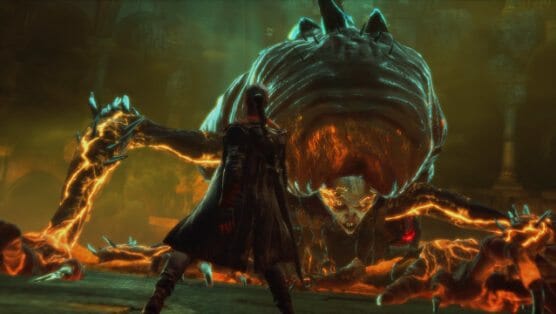
DMC: Devil May Cry Definitive Edition, which I will refer to as DMC from now on, is a repackaging of the 2013 game of the same name for release on the Playstation 4 and Xbox One. If you’re reading this in order to find out if it is worth purchasing: yes. It is a good port and it is just as fun as it was on the last generation of consoles. Consumer report accomplished.
I first played DMC when it was included as a Playstation Plus game sometime last year. I’ve been a fan of the series since Devil May Cry on the Playstation 2, and I have some real Serious Childhood Memories of sitting on the floor of a friend’s bedroom and punching the hell out of monsters with giant, fiery gloves. The sequels to that original game never scratched the same itch, and I didn’t expect more than a few hours of idle entertainment from DMC before I gave up like I had with the previous few games and their HD uprezzes.
I played DMC until the story wrapped up and I put it away forever. And that’s weird, right, because the Devil May Cry franchise is less about making your way through the narrative and more about maximizing the way that you do so. After all, you’re controlling Dante, an ostentatious braggart who swords and guns through demons, and the goal of each level is to complete it as fast as possible with as many style points as possible. You mix up styles, moves and weapons in order to generate those points and make Dante hoop and holler with unthinkably violent glee.
And DMC didn’t do that for me on the Playstation 3. Definitive Edition does. Something imploded deep in my brain and I started pushing myself to the limit. I’m not maximizing my scores for each level—I don’t have the mind or the skill for that—but I’m pushing into higher difficulties than I’ve ever tried in these kinds of games before. I’m not just working through it. I’m playing with remixed enemy behaviors in altered, more-difficult encounters.
What happened? What took me from a mild player to someone who’s gone further than he’s ever attempted in an uprez rerelease of a videogame? The answer is Turbo Mode.
While Turbo Mode has been included in some previous releases in the franchise, I’ve never encountered it before. It is a basic change in gameplay, and its function is simple: it increases the game speed by 20%. That’s a minor change, for sure, but there’s some weird line that the game crosses when the speed increases by that small amount. The windows of action for moves get smaller. Dodges get harder. The game changes from a practiced ballet to a manic horror show where strategy for an entire fight gives way to tactical maneuvers that get you from move to move.
Turbo Mode gives me permission to abandon any pretension to mastery or excellence and merely fight. I don’t overthink anything because I don’t have the option to. I don’t have time.
It feels true to the character of Dante. DMC is a “reboot” of the Devil May Cry franchise and it begins with resetting the metaphysics and major players of the universe. For the most part, though, Dante remains unchanged. In this game he’s young, and he’s spent most of his life murdering demons and having lots of sex, because apparently that’s all that one can do when all of literal Hell is trying to kill you. The plot of the game is a strange romp through contemporary political issues—thinly-veiled versions of Fox News, American Idol and Coca-Cola all get picked apart as various tentacle arms of the Hell-backed Illuminati control spectacle—and Dante is a devil-may-care (har har) protagonist that smashes through all of those things with the help of his brother. All of this was on-the-nose and boring when I did it the first time. A second experience, with a mechanical system as speedy and slap-dash as Dante acted in the cut-scenes, really drove the point home for me. It seems like such a slight change, but it really does make a difference.
DMC: Definitive Edition also includes the “Vergil’s Downfall” DLC. While writing about the specific content would spoil some major things about the game, the real big point of the DLC is the inclusion of Dante’s brother Vergil in his own miniature campaign. Vergil exists in the main game as the mysterious leader of an underground terrorist network with shades of Anonymous. Where Dante flies around while shooting and swording, Vergil is calm and collected. Where Dante is aggressive, generally performing best on the offense, Vergil exists almost exclusively in reaction to enemies and their movements. Having the DLC packaged with the main game is a real treat, and the design of Vergil as a playable character demonstrates that developer Ninja Theory takes narrative into account when designing their sword dudes. These things matter.
DMC: Definitive Edition puts a decent game back in the limelight with some additional content that launches it up above decent and into great. Also there’s a moment where a demon yells “fuck you” and Dante yells “fuck you!” and then the demon yells “FUCK YOUUUU!!!” and now you get to experience that in glorious HD resolution at sixty frames per second in the year of our Lord two thousand and fifteen.
DMC: Devil May Cry Definitive Edition was developed by Ninja Theory and published by Capcom. Our review is based on the Playstation 4 version. It is also available for Xbox One.
Cameron Kunzelman tweets at @ckunzelman and writes about games at thiscageisworms.com.
